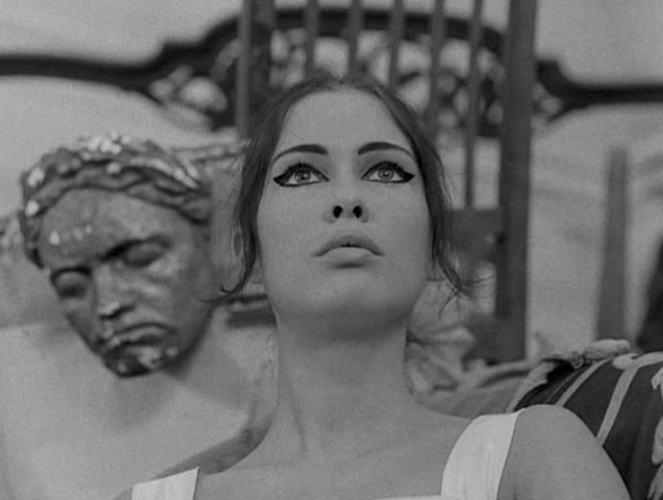Réalisation:
Alain Robbe-GrilletScénario:
Alain Robbe-GrilletPhotographie:
Igor LutherMusique:
Pavol ŠimaiActeurs·trices:
Jean-Louis Trintignant, Sylvia Turbová, Zuzana Kocúriková, Július Vašek, Ivan Mistrík, Jozef Čierny, Dušan Blaškovič, Jozef Kroner, Ivan Letko (plus)Résumés(1)
Dans une région agitée par des guerres récentes, un homme que personne ne connaît arrive à pied. Il s’arrête dans une auberge, écoutant les conversations qui commentent une affaire locale : le retour attendu d’un certain Jean. L’étranger retrouve la demeure de ce héros mystérieux, une grande maison frappée d’abandon. Là vivent retranchées la sœur et la femme de Jean, ainsi que la servante, entourées de portraits du disparu. Charmeur, l’étranger se présente de façon séduisante, si bien qu’on l’écoute et qu’on finit par croire ce qu’il dit, même lorsque ses affirmations se contredisent… (Carlotta Films)
(plus)Critiques (3)
I remember how during the times of true socialism, an unnamed regional museum organized an exhibition dedicated to the local partisan movement during the occupation. They even invited a former Soviet commander to the opening in order to strengthen the inseparable brotherhood of our two nations. The old man looked puzzled at the yellowed photographs that adorned the walls of the two large halls. "Who are these people?" he asked in confusion. - "They are your comrades-in-arms, our heroic partisans." - "Have you gone mad? If I had that many men, I would have driven Schörner out of the Protectorate myself," came the indignant response. This small but characteristic anecdote from the recent past can well illustrate the fact that lies and manipulation have been, are, and will be an integral part of Czech lives, sometimes having the power to shape a virtual reality. Lies as a film theme, therefore, provide a wide range of possibilities, and it's just a matter of how to approach the subject. Imagine, for example, several versions of the same event from the perspective of different actors (which Kurosawa has already worked with) and it would be up to the viewer to discover where the truth lies. Most directors would try to play a sophisticated game with the viewer, gradually unsettling them with subtly revealed hints in their initially unequivocal view of events, and giving them hope that they might eventually unveil the great mystery and the real state of affairs. Grillet approaches things differently. The viewer doesn't interest him because, for him, the film itself is a toy, so he delightfully plays with its form for his own pleasure. From the first few minutes, you know that the main character with an unclear and, above all, changing identity is a pathological liar. Which of his versions and faces is the real one? Probably none of them - and in the end, does it even matter? There are no fixed points of reference. You can only shake your head incredulously as to why the director forcibly inserted posing beauties with striking modern makeup into a World War II story as if they had stepped out of sleazy erotic films with a lesbian theme from that era. Or why the camera lingers so lovingly on the white background. Depending on your nature, you can consider the film either a refined artistic experiment or an affected self-centered authorial pose. I don't deny that the cinematography and the presence of the reliable Trintignant are worth appreciating, but otherwise, it's a disaster. I probably wouldn't find common ground with Grillet even in a debate about the weather. Overall impression: 25%.
()
Both of Alain Robbe-Grillet's Slovak-French films are considered crucial in the era of the search for an independent identity of Slovak cinema. However, even with the hindsight of years, one cannot think that every national cinema should have made a representative of every contemporary genre and thus proved its viability. The random images of Robbe-Grillet are interesting perhaps only because of the participation of Jean-Louis Trintignant, a classic of French cinema. Seemingly familiar stories from the era of the Slovak state are illustrated by shots with Ivan Mistrík, but their veracity disappears whenever one of the foursome of Kocúriková, Turbová, Bréal or Prado appears on the scene. Naive mannerism.
()
La force de l'écrivain réside précisément dans le fait qu'il invente, qu'il invente en totale liberté, sans aucun modèle. La prose moderne présente une caractéristique remarquable: elle souligne délibérément cette nature, au point que l'invention, l'imagination deviennent finalement le sujet du livre." (A. Robbe-Grillet, Pour un Nouveau Roman, p. 23, essai de 1957) Il suffit de remplacer les mots "prose" et "livre" par "film" et nous avons la description de ce film. Tout comme chaque fiction artistique est un mensonge, ce film est aussi un mensonge, seulement avec la différence qu'il est trop puissant, trop intense pour le spectateur ordinaire qui veut se laisser enivrer pendant 90 minutes (aujourd'hui 120 minutes) par un mensonge bienveillant - une histoire compréhensible. Robbe-Grillet dissolve le processus de création du mensonge=de l'intrigue dans le film lui-même. Une autre chose est la flirtation sans fin du présent et du passé, du mensonge et de la vérité (toujours provisoire et actuelle) dans le cadre d'une seule séquence, créant une synchronie unique et étrange dans les films de Grillet.
()

